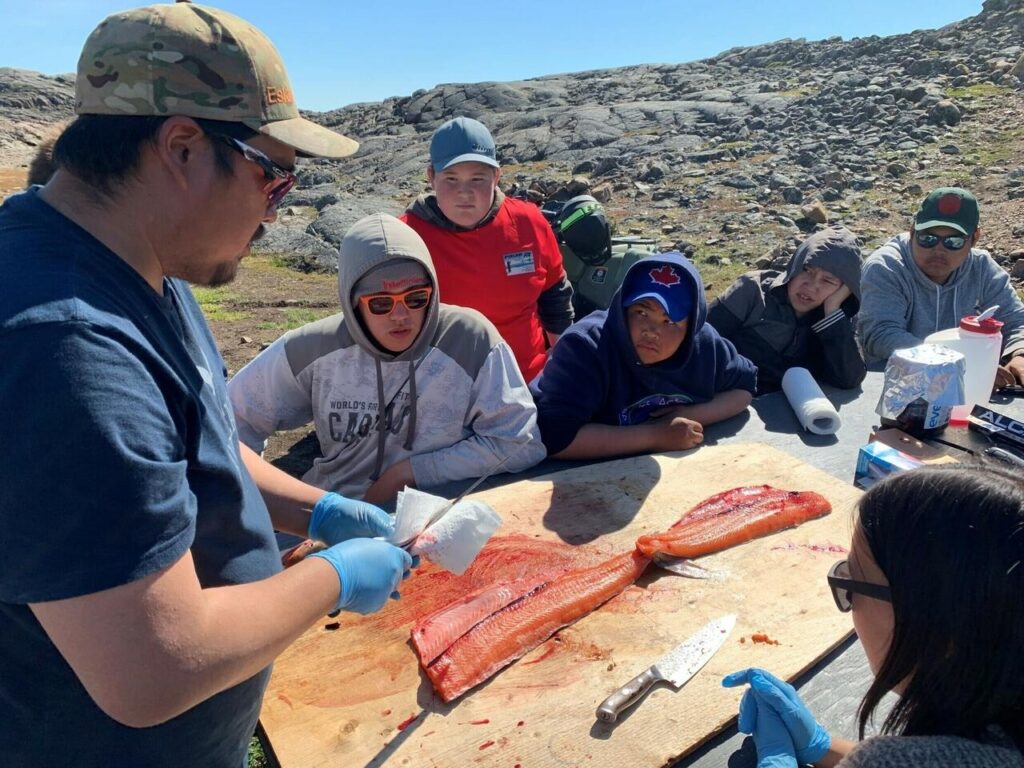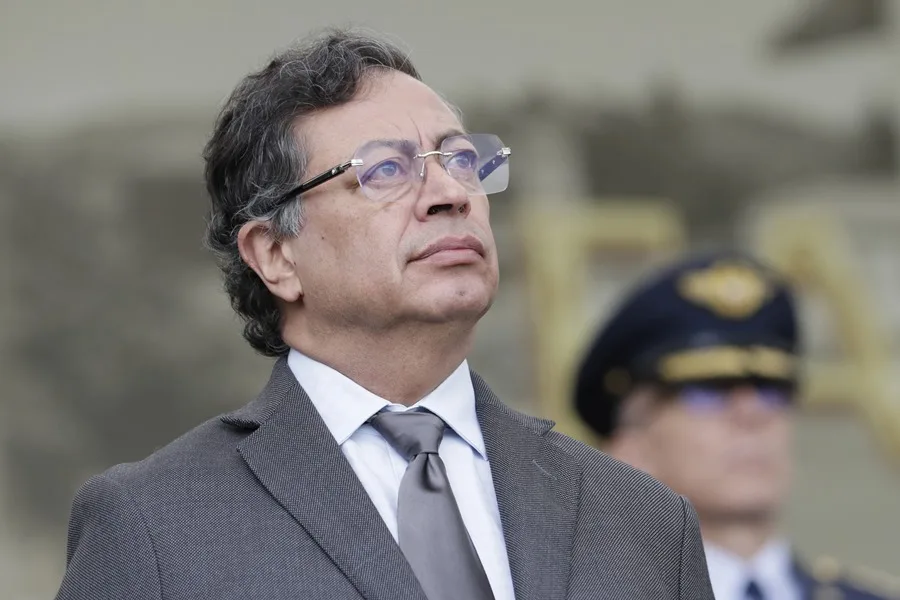International
In Canada’s Arctic, Inuit traditions help combat youth depression

AFP | by Anne-Sophie THILL
Filleting a fish, lighting a fire or building an igloo: In Canada’s Arctic, Inuit youth are being encouraged to connect with their culture in an attempt to prevent severe depression and save lives.
A dozen teenagers and young adults gather around instructor Alex Flaherty. They don’t want to miss any of the traditional hunter’s precise gestures as he carves a fish or lights a fire.
“Our culture has changed so much in the last 50 years when people used to live in igloos… the change is happening so fast, (and) we are losing our culture,” he tells AFP.
Flaherty blames the societal shifts for a series of social ills such as violent crime, substance abuse and a high rate of suicide.
Hoping to help remedy these problems, he’s taken hundreds of teenagers hiking, camping and hunting in the vast tundra in the past three years.
In addition to keeping alive Inuit culture, his government-funded Polar Outfitting program also aims to bolster young people’s mental health and teach them to adapt to a changing climate — in a region that is warming much faster than elsewhere.
Flaherty says he takes mostly youth aged 12 to 20 years old, “because that’s when their lifestyle starts changing (and) when they need help.”
In the summer, they hike across the rocky, windswept lands near the bay city of Iqaluit that is home to some 7,000 residents — and is accessible only by plane most months.
They also learn to make fishing nets to catch Arctic char and to navigate and survive in the pristine but unforgiving environment.
In the dead of winter, when sunlight is reduced to just a few hours per day, they will go out on the ice to fish, and build igloos.
‘Not just about fishing’
At 22, Annie Kootoo is the oldest in the current class. She gushes with joy after spending 10 days in the wilderness.
“I did a lot of activities that I don’t usually do, and it’s been very helpful for my mental health,” she says.
Chris Laisa, a 14-year-old echoes the sentiment. “I feel great,” he says after a lesson.
“It was fun because I learned how to fillet a fish, how to prepare it.”
Flaherty, standing nearby, adds that it’s “not just about fishing. It’s about clearing your mind, being outdoors and sharing with others.”
In the Nunavut territory of northern Canada, where the average age is 28, young people are deeply affected by the isolation and intergenerational traumas caused by past colonial policies.
Like many Indigenous peoples in Canada, the Inuit are haunted by memories of being forced into residential schools where they were stripped of their language and culture, and abused by teachers and headmasters.
Here the suicide rate is much higher than the rest of the country — 76.6 per 100,000 inhabitants in 2020 compared to 10.1, according to Statistics Canada.
Camilla Sehti, the Nunavut government’s head of mental health and addictions services, goes through a long list of what’s contributed to the crisis: “It’s just so many factors.”
Healing, she says, “starts with reconnecting people to their culture.”
“I think colonization had a huge impact on this territory and the ability for people to feel connected to self,” she explains, describing new mental health initiatives that emphasize “family, culture and community.”
After losing her best friend two years ago, Minnie Akeeagok started posting warnings on social media about depression and suicide.
“Everybody in Nunavut knows someone who has committed suicide or faced mental health issues. I personally know more than five,” the 18-year-old told AFP.
“We need more resources, more accessibility within the mental health field in Nunavut,” she says, noting that in the far off communities of this Arctic territory the situation is even more dire.
International
Federal immigration agents kill man in Minneapolis, sparking protests and outrage

Federal immigration agents shot and killed a 37-year-old Minneapolis man during an operation on Saturday, authorities confirmed, sparking new protests and deepening outrage over federal immigration enforcement in the city.
The victim, identified as Alex Jeffrey Pretti, was a U.S. citizen and intensive care nurse who worked at a Veterans Affairs hospital and was widely respected in his community, according to colleagues and news reports.
Officials said the shooting occurred during a targeted immigration raid in south Minneapolis. The Department of Homeland Security (DHS) described the incident as an act of self-defense by agents who believed the man posed a threat.
However, videos reviewed by multiple outlets and eyewitnesses show Pretti holding a phone and not displaying a weapon before being pepper-sprayed, tackled by agents and then shot multiple times, raising serious questions about the official account.
The killing comes amid a broader federal immigration enforcement operation in the city and follows another controversial shooting in early January in which Renée Good, a 37-year-old U.S. citizen, was fatally shot by an ICE agent, leading to widespread protests and criticism of federal tactics.
International
Delcy Rodríguez seeks political agreements after Maduro’s ouster

Venezuela’s interim president, Delcy Rodríguez, on Saturday called for “reaching agreements” with the opposition to achieve “peace” in the country, which the United States says it now controls following the military operation that removed President Nicolás Maduro from power.
Rodríguez, who previously served as Maduro’s vice president, assumed interim leadership after the leftist leader was captured on January 3 during a military incursion that left nearly 100 people dead.
In her first public statements since taking office, Rodríguez signaled a shift in the strained relationship between Caracas and Washington, while also committing to the release of a “significant number” of political prisoners.
“There can be no political or partisan differences when it comes to the peace of Venezuela,” Rodríguez said during an address in the coastal state of La Guaira, broadcast on state television VTV.
“From our differences, we must speak to one another with respect. From our differences, we must meet and reach agreements,” she added.
The day before, Rodríguez instructed the head of Parliament — her brother Jorge Rodríguez — to convene talks with various political sectors in the country aimed at achieving “concrete and immediate results.”
International
Bogotá and Quito Seek Dialogue After Tariffs and Power Cut Escalate Tensions

Bogotá and Quito will hold an emergency bilateral summit next week amid recent developments that have strained relations between the two countries.
Tensions escalated this week after Ecuadorian President Daniel Noboa unexpectedly announced a 30% tariff on Colombian imports. Colombia responded with a reciprocal measure, imposing the same tariff on around 20 Ecuadorian products and suspending electricity exports to Ecuador.
Aware that electricity imports are critical to easing Ecuador’s recent energy crises, Quito further imposed a 30% tariff on the transportation of Colombian oil through its territory.
However, recent statements from the Ecuadorian government suggest that dialogue between the two sides has intensified in recent hours. Ecuador’s Minister of Foreign Affairs, Gabriela Sommerfeld, confirmed that active conversations are under way.
In Colombia, segments of the business sector have welcomed the prospect of negotiations. The National Business Council (Consejo Gremial Nacional, CGN), for instance, urged both governments to restore commercial relations, warning that the dispute “puts jobs and regional economic stability at risk.”
-

 International4 days ago
International4 days agoMexican influencer “La Nicholette” kidnapped in exclusive area of Culiacán
-

 International4 days ago
International4 days agoTrump to invite Venezuela’s interim president Delcy Rodríguez to Washington
-

 Central America4 days ago
Central America4 days agoMazatenango Carnival cancelled amid State of Siege in Guatemala
-

 International4 days ago
International4 days agoMajor winter storm to blanket U.S. and Canada with snow, ice and arctic cold
-

 International4 days ago
International4 days agoMarkets rise as Trump halts Europe tariffs and floats Greenland agreement framework
-

 International4 days ago
International4 days agoColombia slams Ecuador’s 30% tariff as ‘economic aggression’
-

 International5 days ago
International5 days agoTrump announces preliminary NATO agreement on Greenland, suspends tariffs on Europe
-

 International4 days ago
International4 days agoVenezuela’s interim president predicts 37% increase in revenues for 2026
-

 Internacionales3 days ago
Internacionales3 days agoMajor winter storm threatens “catastrophic” ice and snow across much of the U.S.
-

 International2 days ago
International2 days agoTrump-Era Defense Plan Prioritizes Border Security and Scales Back Global Commitments
-

 International4 days ago
International4 days agoJapan reopens Kashiwazaki-Kariwa Plant despite public concerns
-

 International4 days ago
International4 days agoFour minors killed in deadly clash between FARC dissidents in Colombia’s Amazon
-

 Central America3 days ago
Central America3 days agoGuatemala’s president rules out negotiations with inmates after prison riots
-

 International3 days ago
International3 days agoGuatemala considers sending high-risk gang members to military prisons
-

 International2 days ago
International2 days agoBogotá and Quito Seek Dialogue After Tariffs and Power Cut Escalate Tensions
-

 International4 days ago
International4 days agoJosé Jerí claims destabilization attempt after videos of secretive meetings surface
-

 International21 hours ago
International21 hours agoDelcy Rodríguez seeks political agreements after Maduro’s ouster
-

 International3 days ago
International3 days agoRights group says over 5,000 killed in Iran protests, mostly civilians
-

 International21 hours ago
International21 hours agoFederal immigration agents kill man in Minneapolis, sparking protests and outrage


























